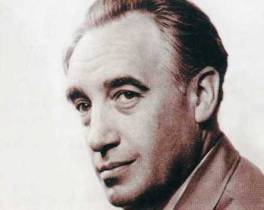 Constantin Silvestri (31 May 1913, Bucharest – 23 February 1969, London) Silvestri, born of Austro-Italian-Romanian stock, was brought up on his own by his mother, his father dying from alcoholism and his stepfather dying when the boy was 16. He had learnt how to play the piano and organ before the age of six. He played the piano in public at 10 and was a skilled improviser. He studied at the Târgu Mureş Conservatoire, and later at the Bucharest Conservatoire. His teachers in Bucharest included Mihail Jora (composition) and Florica Musicescu (piano). Despite not having taken conducting classes, he was already appearing as conductor in his teens, making his debut in 1930 with the Bucharest Radio Symphony Orchestra in a concert which included The Rite of Spring and his own composition Prelude and Fugue (Toccata). Silvestri's success in this 1930 National Radio Orchestra of Romania concert persuaded him to follow conducting as a career. He conducted at the Romanian National Opera from 1935 on, and, following the brief tenures of two caretakers, he also directed the Bucharest Philharmonic Orchestra for six years as successor to George Georgescu, in disgrace as a Nazi collaborator. Georgescu, ironically, assumed directorship of the Radio Orchestra; following Silvestri's emigration to the West, Georgescu would resume his place at the head of the Philharmonic, shortly thereafter renamed the George Enescu Philharmonic. From 1948 to 1956, Silvestri taught at the Bucharest Conservatoire (Conservatorul din Bucureşti), where he founded its Conducting Department. Among Silvestri's students were Sergiu Comissiona, Marius Constant, Anatol Vieru, Iosif Conta, Edgar Cosma. By the 1950s Silvestri was accepting guest engagements in the USSR, Czechoslovakia and Hungary. His career in Romania came to a climax in 1958 with the highly successful Romanian premiere of Oedipe in Bucharest. After leaving his home country Silvestri made Paris his domicile in 1959, also travelling to Australia that year, and appearing with the Chicago Symphony Orchestra and Philadelphia Orchestra in 1960-61, and making a number of recordings in Paris, London and Vienna for EMI. Having made his UK début with the London Philharmonic Orchestra in 1957 at the Royal Albert Hall, Silvestri moved to England in 1961 on assuming the post of Principal Conductor of the Bournemouth Symphony Orchestra. He raised the standard and prestige of the orchestra to one of international standing. He was demanding and meticulous in rehearsal, his scores marked in different colours; however, his performances often differed from one concert to the next. He became a British citizen in 1967 shortly before his growing reputation was cut short by increasing ill health, and he died of cancer at the age of 55. His last concert was in Exeter on 29 November 1968, and there is a memorial at St Peter's Church in Bournemouth. *********************************
Antonín Dvořák
Symphony No. 9 in E minor, Op. 95
Nikolai Rimsky-Korsakov
Capriccio espagnol, Op. 34
5.04.1964
George Enescu
Romanian Rhapsody No. 1 in A major, Op. 11
21.03.1964 Pyotr Ilyich Tchaikovsky Symphony No. 4 in F minor, Op. 36
Hugo Alfvén
Swedish Rhapsody No. 1 ''Midsommarvaka''
Antonín Dvořák
Slavonic dance No. 1 in C major, Op.46
2.05.1964
Live at Tokio Bunkakaikan Hall
NHK Symphony Orchestra
CONSTANTIN SILVESTRI
*********************************
Материал из личной коллекции | 
